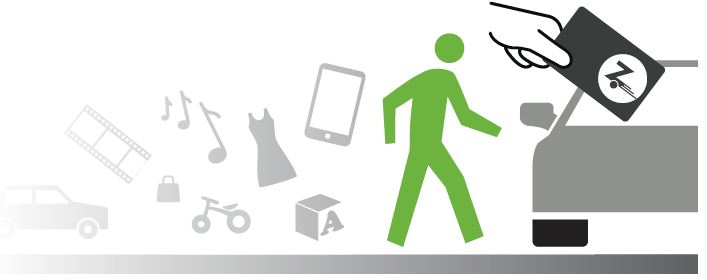Over and over we've seen Millenials demonstrate that they're not obsessed with acquiring things like previous generations. Instead of rushing to "keep up with the Jones'" Generation Y use their smart phones to access services and connect with communities that cost less (or are free!), and overdeliver on satisfaction.
Zipcar, one of the world's largest car sharing services, recently published a new report on this phenomenon, and how it's playing out in the United Kingdom. The report, "Pay-As-You-Live: The Business of Sharing in the UK" finds that, like in the U.S. and elsewhere, young Brits are more interested in sharing and renting than owning and buying. According to the study, one in five UK residents under 55 say they are more likely to rent than they were a year ago. This is double the number of those aged 55 and over who say they'd rather rent than buy.
The sharing economy in the UK alone was recently valued at £22.4 billion. Rather than spelling disaster for entrepreneurs, it represents an opportunity to develop services that more accurately meet Gen Y's needs, while generating less waste in the process.
This year, we’ve seen Mutual Aid in Motion.
From scaling sharing hubs to Mutual Aid 101 trainings, we’re helping communities build the tools they need.
Every dollar fuels lasting resilience – proving that when we move together, we all move forward.
“A number of years ago we noticed a paradigm shift in thinking, away from a desire to own assets to a more collaborative wish to access services, which is more sustainable in the longer term," said Mark Walker, General Manager, Zipcar UK. "We spotted a gap in the market for a new car hire model with collaboration at its heart: a pay-as-you-drive model for a pay-as-you-live lifestyle. This is made possible by new technologies and a desire amongst our members to simplify and improve the way they get around, on a trip-by-trip basis.”
Seizing this opportunity to meet market demands in a unique way is great, but the report didn't stop there. Like others before it, the study sought to suss out the reasons behind this international paradigm shift.
Why are Millenials content to share and rent things instead of owning them? How can new collaborative consumption ventures connect with this highly salient audience as well as their elders?
Respondents to the Zipcar survey said total cost of ownership along with on-going maintenance costs (45%), depreciation (38%), and the flexibility to upgrade or change models depending on the occasion (29%), are key factors when determining whether to rent or purchase goods outright.
The study also found that many younger adults would not rule out hiring less traditional items, such as art (49%), clothing (47%), and children’s toys (54%) as they become increasingly comfortable with the pay-as-you-live lifestyle.
The keys here, as other studies have pointed out, is making it easy and comfortable for all ages to try sharing services for the first time. This means identifying and overcoming barriers for those who grew up in a time when owership exemplified personal worth.
Collaborative consumption companies that create simple, low risk opportunities for experimentation are more likely to attract reluctant users. Transparency and genuine concern for user security is paramount–incorporating methods for users to provide feedback on the experience, whether positive or negative, allows people to feel valued and more likely to share again. Convenience also makes it more likely that those who are used to the instant gratification of ownership will warm to the idea of sharing instead.
Download the entire report as PDF here.
Previously on Shareable:
- The Gen Y Guide To Collaborative Consumption
- Gen Y Drives Less, And Not Just Because We're Broke
- Does Car Sharing Really Reduce Vehicle Ownership?

